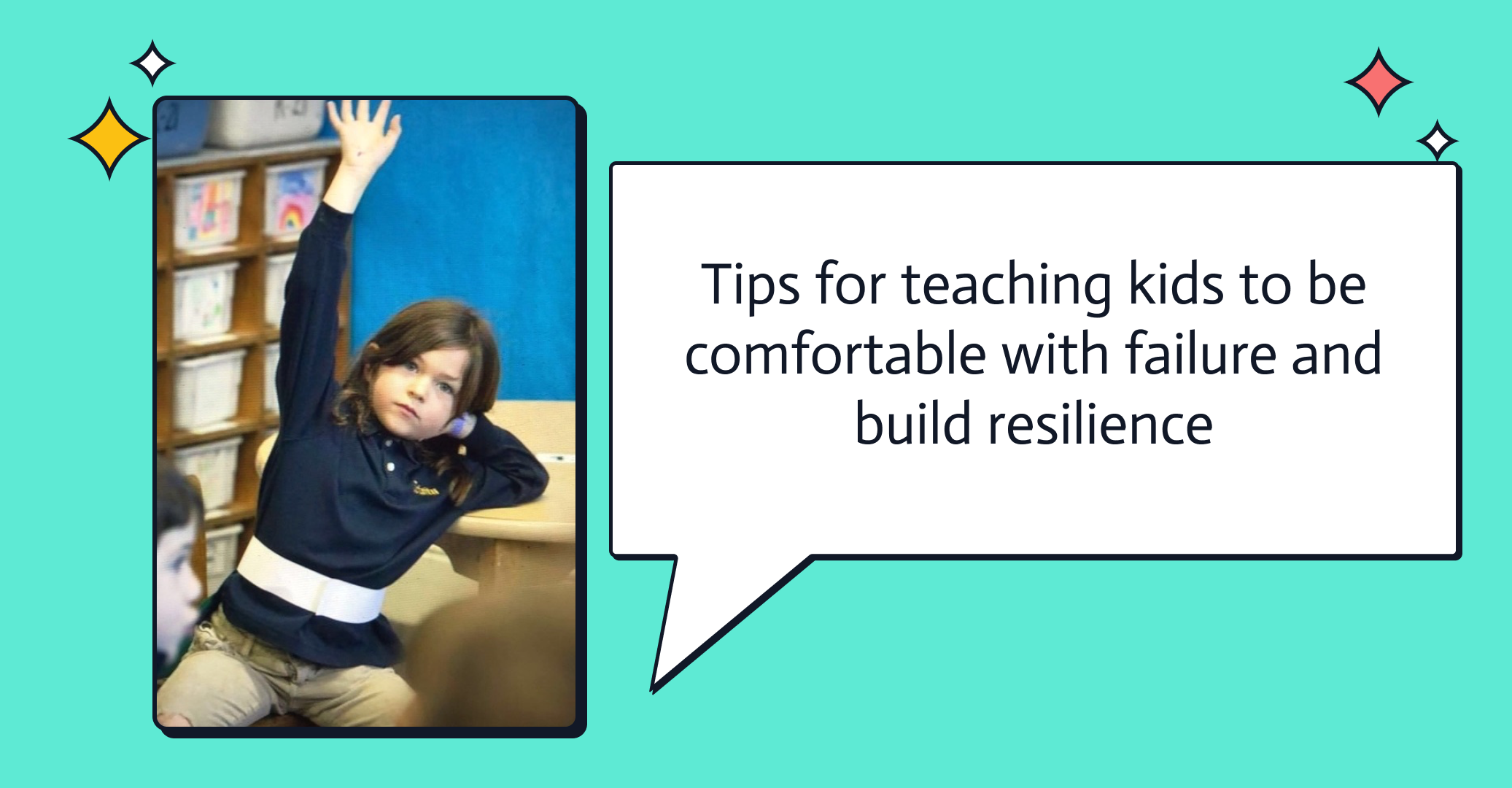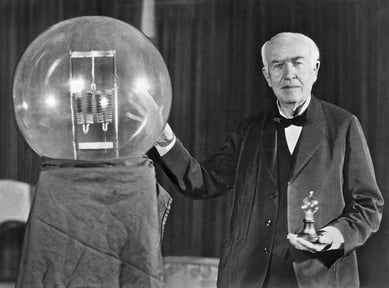I Failed and You Should, Too

Why do kids have such a crippling fear of failure? How can you help them learn to fail gracefully? And why is failure so important to begin with?
Let’s first start with a disclaimer: failure is important, but students’ response to failure is even more so.
Failure + positive response to failure = building resilience
Failure + negative response to failure = deepening insecurities/stagnating growth
I made a lot of mistakes in high school, but the only mistake I regret to the present day is dropping down from honors math to regular math after getting a bad grade on a test. Why? Because instead of having the belief in myself to stick with the class, I decided to succumb to what felt like a guaranteed solid grade and smooth sailing.
I failed and responded poorly.
I didn’t learn anything from dropping to regular math. It only confirmed the voice screaming in my head, “You’re bad at math, Audrey!” I should have stuck with it.
 Failure I did learn from came from my experience as a competitive track runner. In spring of 6th grade I ran a 5:18 1500m, allowing me to compete in the Junior Olympics. In fall of 7th grade, after winning the fifth avenue mile in a 5:37 time, I won every single 7-8th grade cross country meet.
Failure I did learn from came from my experience as a competitive track runner. In spring of 6th grade I ran a 5:18 1500m, allowing me to compete in the Junior Olympics. In fall of 7th grade, after winning the fifth avenue mile in a 5:37 time, I won every single 7-8th grade cross country meet.
Then I stress fractured both my shins, went through puberty, and didn’t break my best time from 7th grade until 10th grade. It sucked! Competitors I formerly beat with ease were beating me. I’d look up at the clock after running what I thought may be a personal best to see defeat: a slower time than my 7th grade self.
But, I didn’t give up. My dream to run in college motivated me to keep trying. When injured, I cross trained ferociously. When healthy, I went to bed early, ate healthy, and did my planks before bed.
 By 11th grade, I finally had my breakthrough. I broke all the school distance records and ran a time that enabled me to qualify for the state meet. Finally! I was also speaking to track coaches at some of my dream colleges.
By 11th grade, I finally had my breakthrough. I broke all the school distance records and ran a time that enabled me to qualify for the state meet. Finally! I was also speaking to track coaches at some of my dream colleges.
When I decided not to run in college, it felt like failure. All my hard work for nothing?
But when I came to Stanford I realized that all the energy I had poured into running could be applied elsewhere. I applied for every fellowship, emailed every professor, and crushed school with more confidence than I ever had.
Now when people ask me what experience set me up to be a founder/CEO Stanford “stop out,” I respond without hesitation that it was my experience as a competitive runner. I failed time and time again, but kept trying and never stopped believing.
As an entrepreneur, you have to wake up everyday and believe with every morsel in your body that what you’re building not only deserves to exist in this world, but will make it a better place than how you initially found it. Even when the business isn’t doing well or it feels like every obstacle stands in the way of you and your dream, you gotta believe.
So why overcome failure and build resilience? And how?
Because whether it’s as a startup founder, applying to jobs, receiving a bad grade on a test or feedback from a manager, you will never stop “failing.” Some places you’ll face it more gravely than others. But it’s about how you respond to that rejection that defines your character and increases your chance of success. So, you might as well learn how to face failure with grace.
Learn how to overcome failure with confidence, and you’ll increase the range of opportunities available for you.
People who hate failing avoid situations where they may fail. They make choices based on where they have the highest chances of success, acting with an attachment to security and comfort in mind.
If I had given up by 9th grade, 2 years later after still not beating my 7th grade best self, I never would have come close to uncovering my potential as a runner.
If I had stuck with honors math, who knows what doors may have opened for me?
So, how can you help your child become comfortable with failure in pursuit of their dreams?
First of all, create an environment that discusses failure openly. Don’t stigmatize it or make it the elephant in the room, confront it.
- Talk to your child about times you’ve failed and what you learned from that failure. How did you react? Are you proud of how you responded or regretful?
- Which famous people have failed and kept trying till they made it?
What about when your child experiences failure themselves?
Try reacting to failure with these two phases:

Let me paint a picture: your daughter comes home from school sulking. You try to ask her how her day went but she rushes to her room and slams the door. At dinner that night, she opens up. “I failed … (insert: my math test, my soccer tryouts, my audition for the musical, my SAT, etc…)”
***IMPORTANT: at this critical moment when your child admits to their failure, resist the urge to contort your face or your eyebrows or whatever you do to signal disappointment or to blurb out why.***
Share that you’re sorry to hear this. If you’re a hugger, give them a hug. Before proposing solutions, leave space for mourning.
Make sure your child knows that you’re not going to reprimand them for being honest about “failure.” You’re on their team.

As soon as it feels like the right time, this is where you help your sulking daughter turn her tears into a to do list.
This is where you remind your child that they tried their best (assuming they did) and they care, which is so important. But what’s most important is how they respond from here!
Give them space to share their own ideas or reflections of what moving forward from failure looks like.
If they don’t believe you, equip them with examples:
- Martin Luther King received a C+ in public speaking in high school.
- Walt Disney’s first studio, Laugh-O-Gram, lasted two years before going bankrupt in 1923.
- Thomas Edison failed over 10,000 times trying to invent a commercially-viable electric bulb. When asked by a reporter whether he felt like a failure after so many failed attempts, he replied “I have not failed 10,000 times. I have succeeded in proving that those 10,000 ways will not work.”
- The list goes on…!

Thomas Edison with his finished lightbulb
Then support them with ideas to take action from here:
- Talk it through: Why don’t we talk through what you think went wrong and how we can learn from that for next time?
- Encourage personal reflection: Why don’t you journal about what happened here and come up with an action plan to move forward?
- Empower self-advocacy: Can you speak to the math teacher, soccer coach, musical theater teacher, etc to share how disappointed you are and ask for their guidance in improvement from here?
At the end of the day, what’s most important is demonstrating that failure is the greatest opportunity for learning - both materially and personally. When you examine your failure, it’s an opportunity to uncover what actually went wrong to learn for next time. But most of all, it’s a chance to learn that you’re capable of navigating ups and downs, and bearing more than you think.
James Joyce said it best: “mistakes are the portal of discovery.”
If your child is looking to explore a tough topic without the fear of a bad grade or just doesn’t know where to start with a challenging subject, turn to Curious Cardinals. We can help them learn to fail and then get back up stronger than ever.

-1.png)
-1.png)